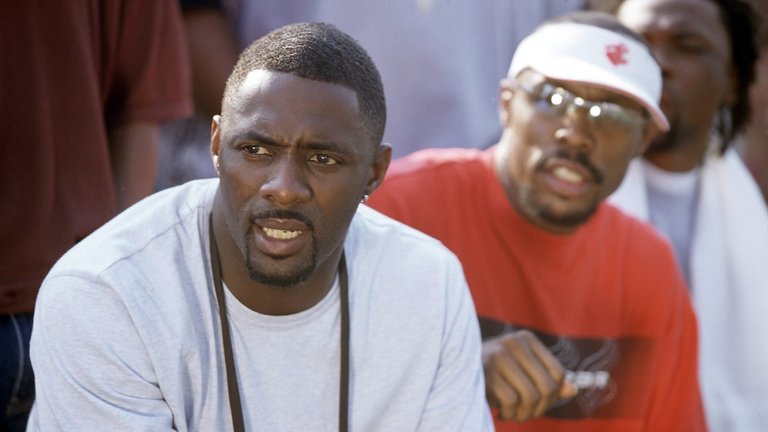Television Review: Game Day (The Wire, S1X09, 2002)

Lessons (S01E9)
Airdate: August 4th 2002
Written by: David H. Melnick & Shamit Choksey
Directed by: Milčo Mančevski
Running Time: 56 minutes
While the intricate machinery of the Baltimore drug trade forms the undeniable backbone of The Wire, particularly in its seminal first season, the series consistently demonstrates a far more profound ambition. It meticulously situates this trade within a suffocating ecosystem of interconnected economic decay, cultural erosion, and political malfeasance that defines the city itself. The Wire never allows the viewer to mistake the narcotics trade for the sole pathology; rather, it presents it as a violent symptom of deeper, systemic rot. Furthermore, the show possesses a unique genius in illustrating how the toxic after-effects of this trade – the relentless rivalries between criminal factions – can manifest in startlingly unconventional, almost ritualistic, forms. It is precisely within this nuanced exploration that the episode Game Day (written by David H. Melnick and Shamit Choksey) finds its compelling significance, transcending a simple procedural narrative to offer a microcosm of Baltimore's complex, fractured reality.
The episode's title, far from being metaphorical, refers to a grimly established tradition on Baltimore’s mean streets: an annual, high-stakes basketball game pitting teams sponsored by the city's dominant drug organisations. The West Side squad, bankrolled by the formidable Avon Barksdale and his disciplined crew, faces off against the East Side contingent, underwritten by the shrewd and calculating Joseph “Proposition Joe” Stewart (portrayed by Robert F. Chew). This event is not mere recreation; it is a vital piece of social infrastructure, a temporary truce zone where territory disputes are momentarily suspended on the court, reinforcing the drug lords' quasi-legitimate authority within their respective communities. The sheer scale of its impact becomes immediately apparent to Detectives Herc and Carver, perched bewildered on rooftops overlooking the deserted Pit. The thoroughfares lie eerily empty, a phenomenon that baffles them until the spectacle of the game itself dawns upon them. Crucially, this very spectacle, culminating in an East Side victory despite Avon’s recruitment of high-school talent, proves unexpectedly fortuitous for the Lieutenat Daniels' task force. The rare, unguarded gathering provides them with a visual identification of the notoriously elusive Avon Barksdale – a critical piece of evidence Daniels desperately needs. Facing immense political pressure to deliver a major arrest that guarantees conviction, Daniels requires irrefutable proof of Avon’s presence at the scene of his organisation’s operations; the basketball game, an event born of criminal rivalry, inadvertently supplies it.
This fragile moment of relative calm, however, is swiftly shattered by the resumption of the brutal conflict with Omar Little. Ignoring Stringer Bell’s pragmatic calls for a temporary ceasefire to preserve resources and avoid heat, Avon’s obsession with organisational reputation propels him back into the fray. Omar executes another audacious heist, stealing a significant quantity of Barksdale narcotics. Demonstrating his characteristic opportunism, he then delivers the contraband directly to Proposition Joe, trading it not for money, but for the simple yet invaluable commodity of Avon’s cell phone number. Omar uses this intelligence to set a deadly ambush. Yet, the narrative subverts expectations: Avon’s life is spared not by his own cunning, but by the accidental, fortuitous intervention of Wee-Bay, who wounds Omar in the shoulder – a stark irony given Omar had previously shot Wee-Bay. This sequence is pivotal, puncturing the myth of Omar’s invincibility and highlighting the capricious, often accidental, nature of survival on these streets.
Directed with steady, unshowy competence by Milčo Mančevski, Game Day masterfully weaves its central plot with several minor yet deeply consequential subplots. Shardene Innes, devastated by the tragic fate of her colleague Keisha Michaels, is successfully flipped by the detectives, leading her to sever ties with D’Angelo Barksdale. D’Angelo himself, increasingly burdened by conscience, attempts a genuine intervention, urging Wallace to abandon the crew and return to school. Tragically, the money D’Angelo provides Wallace is swiftly consumed by his addiction, rendering the effort futile and foreshadowing Wallace’s grim destiny. Meanwhile, Bubbles, after a darkly comedic misadventure involving a worthless stolen stash and a chance encounter with the pragmatic drug counsellor Walon (Steve Earle), tentatively resolves to seek sobriety – a fragile hope amidst pervasive despair.
The episode also continues to utilise Herc and Carver as the series' primary, albeit grimly ironic, source of comic relief. Temptation to pocket some cash during Wee-Bay’s capture, followed by their panicked attempts to cover the discrepancy when reporting to Daniels, exemplifies their chronic incompetence and moral laxity.
Most significantly, Game Day offers a crucial, implicit deconstruction of the Omar Little mythos. While Omar is presented as a figure who redistributes stolen drugs to addicts (who then act as his informal surveillance network), and who pragmatically collaborates with both police and rival kingpins like Proposition Joe, the episode deliberately strips away any romanticised veneer. His alliance with Joe is purely transactional, born of mutual convenience, not principle. The failed ambush, precipitated by mere chance and resulting in his wounding by the very man he had previously injured, serves as a powerful reminder: Omar Little is not a noble avenger, but a skilled, ruthless operator operating within the same brutal, amoral ecosystem as everyone else. He is vulnerable, fallible, and ultimately just another player in Baltimore’s tragic, cyclical game. Game Day thus transcends its sports-themed title, using the basketball spectacle as a lens to expose the intricate, often contradictory, web of power, survival, and consequence that defines The Wire's unparalleled vision of the American city. It shows how the drug trade is merely one thread in a tapestry of urban dysfunction, where moments of communal ritual can simultaneously serve criminal enterprise, aid law enforcement, and shatter the illusions of its most iconic anti-hero.
RATING: 7/10 (+++)
Blog in Croatian https://draxblog.com
Blog in English https://draxreview.wordpress.com/
InLeo blog https://inleo.io/@drax.leo
InLeo: https://inleo.io/signup?referral=drax.leo
Leodex: https://leodex.io/?ref=drax
Hiveonboard: https://hiveonboard.com?ref=drax
Rising Star game: https://www.risingstargame.com?referrer=drax
1Inch: https://1inch.exchange/#/r/0x83823d8CCB74F828148258BB4457642124b1328e
BTC donations: 1EWxiMiP6iiG9rger3NuUSd6HByaxQWafG
ETH donations: 0xB305F144323b99e6f8b1d66f5D7DE78B498C32A7
BCH donations: qpvxw0jax79lhmvlgcldkzpqanf03r9cjv8y6gtmk9